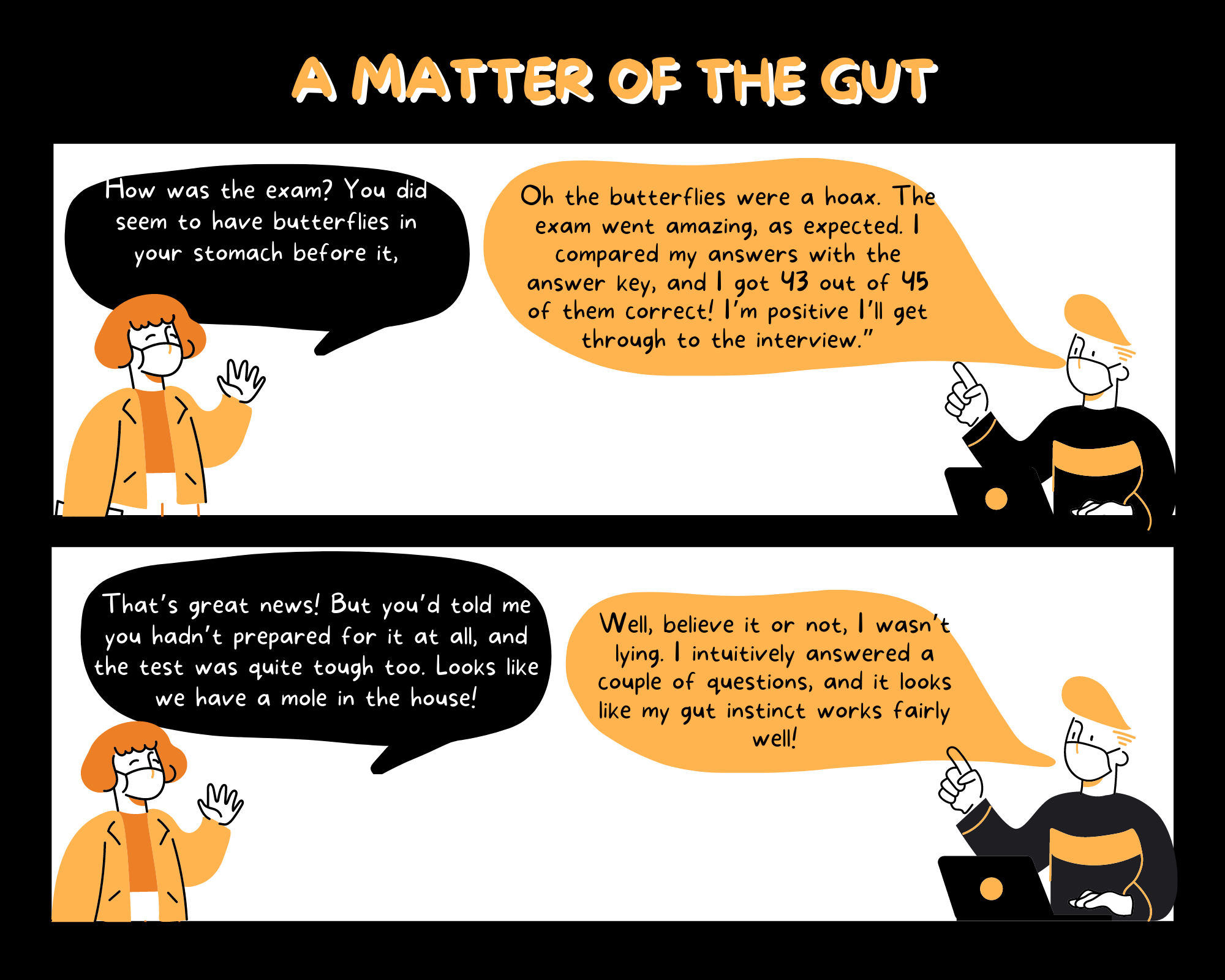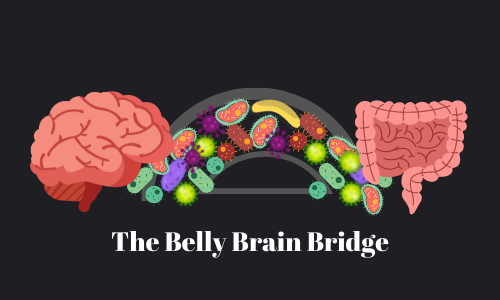Have you ever felt inexplicably sad, depressed for no apparent reason, unnecessarily stressed or uninterested in the things you generally like doing the most? Have you ever wondered why you could be feeling that way? Most people tend to term this “a passing phase” that “you’ll eventually get over”. A few hypochondriacs spiral into a rabbithole of overthinking and diagnose themselves with nothing less than “a dangerous brain disorder that’s causing depression followed by gradual but imminent death”. Or you could just Google it and you’ll find yourself with a brain cancer prognosis and multiple drug prescriptions in no time.
Jokes apart, have you wondered if your gut could be playing a role here? If you paid close enough attention to your tummy health during these so-called “occasional low phases”, you’d actually get a hint as to why you were, quite literally, “down in the dumps” off late (all puns intended).
A Bug Brain Moment!
Just imagine someone walking up to you on one of your bad days, and stating that some tiny microorganisms way down in your intestines were talking to your brain and taking your mood for a roller coaster ride that only goes downhill. You’d call them batshit crazy!
And that’s exactly what happened about 2 decades ago, with neuroscientists like Jane Foster and John Cryan and doctors like George Porter Phillips, who began exploring the possible connections between gut bacteria and the brain. They were contemporaries working in the same field at around the same time. They independently ran tests and comparative analyses on mice with and without healthy gut microbiomes, and even on humans diagnosed with depression. What they found out was just too “ridiculous” for the scientific community to accept as a true biological phenomena: “Bugs all the way down in your belly, can and essentially always do, bug your brain”.
It was a matter of guts, in all senses of the word, for these scientists to be able to stand by their views and convince the world about this bridge between the belly and the brain, and that was how the “microbiota-gut-brain axis” became a hot topic that would, in the coming years, take the scientific community along for a ride.
The Gut Brain axis

. . .
You must have been a part of many such similar conversations with your friends, that involved “butterflies in the stomach” and “gut feelings” . Though many of us don’t trust it, these terms get little credit for the meaning they carry. Butterflies, in essence, are a euphemism for the bacteria in your gut that influence your mood. Gut feelings/instincts/intuition are just arbitrary phrases thrown around when people don’t have an explanation as to why their random guesses turned out to be correct, when in actuality, they are subconscious decisions driven by the “brain in our bowels”, if I may – the Enteric Nervous System.
The Enteric Nervous System (ENS) is also called the secondary brain, and is an indispensable part of the nervous system. It has more than 100 million neuronal connections all along the small intestine and large intestine and autonomously safeguards both. It stays in constant dialogue with the digestive system and the nervous system, and any dysfunction in the ENS is seen as a visible problem in either your gut, your brain, or sometimes horrifyingly, both. The ENS communicates to the Central Nervous System(CNS) via the vagus nerve, which innervates the gut. In patients with Irritable Bowel Syndrome there was a marked reduction in vagal function, which caused an emotional domino effect in the brain such as increased anxiety and depression. Since the vagus nerve functions in both directions, an increase in stress and anxiety can also translate into digestive disorders ranging from simple indigestion to serious bowel diseases.
Now you know why you lost your appetite before the dance performance on stage, or why you developed nausea a night before that dreadful math exam, or even, why you felt abominably low the morning after eating unhealthy food outside.
A Medley of Microbiota, Mood and Food
Having understood how the bowel and the brain are connected, there’s one last piece of jigsaw left to complete the puzzle- the microbiota.
Having a healthy gut is something that not many of us can flex these days, thanks to the unspoken pandemic of “Neglect All Health” with a host of viruses that started with “Unhealthy food habits”, mutated into “No time for exercise” which in turn mutated into “Work at the cost of your lives” and keeps mutating into potentially dangerous strains by the day. If this is not a “biological war” that we are voluntarily waging against ourselves, I don’t know what is. We have trillions of microbes living in our gut, some helpful while some harmful. All are essentially harmful once they cross the gut into the blood, but in their territory, most are good samaritans. They help in keeping your digestion and bowel movement healthy and even prevent pathogenic bacteria from colonising your gut.
Studies on fossilised faeces of our ancestors have suggested that humans had a very diverse gut microbial diversity. This was due to their healthy diets of fruits, roots, meat and roughage. In the 21st century where fruits only come in sugar-endowed smoothies, roots are pureed, mashed and completely stripped off their nutrients, meat is enjoyed spicy and fried and roughage is history, our microbiota have been the tradeoff. And with this tradeoff comes the dysfunctional microbiota-gut-brain connection that has been among the causative agents of so many behavioral and neurodegenerative disorders in the recent past.
According to a study conducted on Parkinson’s patients last year, it was found that the Parkinson’s microbiome has a significantly different structure than that of a healthy microbiome, and that gastrointestinal problems start showing up quite early on during the pathological onset of the disease. This means that diet could be a stronghold for fighting against the disease in its infancy and preventing the progression of this debilitating disease. Similar studies have been conducted for Alzheimers Disease and stroke recovery too and have shown fascinating results.
All this points to one thing – Diet. A good diet can help you stay gut-healthy and brain-healthy too. I’m positive you would have read a lot about what a good diet entails- the same old green leafy vegetables, fresh fruits, proteins, carbs yada yada yada. But I’m also positive that you would have never thought about it from the perspective of the bugs in your gut. Feeding them well keeps them happy, which keeps your gut healthy, which in turn signals happiness hormones to your brain. Not just this, there have been studies showing that a healthy gut helps keep you young too! This would definitely be an incentive for most of us to switch to a healthier lifestyle.
So when you feel your belly-brain bridge falling down, build it straight back up, not with iron bars or gold and silver, but with healthy food, exercise and a better lifestyle. The next time you feel low or irritable, and someone says “it’s all in your head”, you know that in reality, it’s mostly all in your gut.
References:
- https://www.nature.com/articles/d41586-021-00260-3#ref-CR14
- https://www.bbc.com/future/article/20190218-how-the-bacteria-inside-you-could-affect-your-mental-health
- https://www.hopkinsmedicine.org/health/wellness-and-prevention/the-brain-gut-connection
- https://www.healthline.com/nutrition/gut-brain-connection
- https://www.nature.com/articles/d42859-019-00021-3
- https://www.pnas.org/doi/10.1073/pnas.1419136111
- https://neurosciencenews.com/parkinsons-micorbiome-18012/
- https://www.nytimes.com/2021/03/18/well/eat/microbiome-aging.html#:~:text=Scientists%20have%20suspected%20for%20some,are%20less%20fit%20and%20healthy.
. . .
Writer and Illustrator

Anushree Krishnamurthy
Co-founder and Director of Website development and Logistics


Superb article . You explained in very simple words that person ike me with a very minimum knowledge of our bio system can understand the complexity and connection of brain and gut.. thank you for this article .
Superb article.you explained the connection of gut and brain in such a simple way that a person like me with a minimum knowledge of our bio system can easily understand . Thank you so much for this article. Keep writing .
Very informative and thought provoking
Hai Anushree
Good one …very much informative
Keep writing
👌☺️
2gd … Vry vry NYC and informative 👍
informative 👍 and 2gd 👍